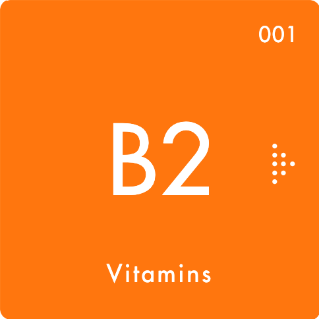
Health functions
Vitamin B2 (riboflavin) contributes to the maintenance of normal skin and mucous membranes, red blood cells, vision, and nervous system function. Read More

Vitamin B2, also known as riboflavin, is a water-soluble B vitamin. The term ‘flavin’ originates from the Latin word ‘flavus’ referring to the yellow colour of this vitamin. Vitamin B2 is found in the human body primarily as an integral component of the coenzymes flavin adenine dinucleotide (FAD) and flavin mononucleotide (FMN) (1). Coenzymes derived from riboflavin are termed ‘flavocoenzymes’, and enzymes that use a flavocoenzyme are called ‘flavoproteins’ (2).
Vitamin B2 deficiency is rare, but may occur in combination with deficiencies of other water-soluble vitamins.
Authored by Dr Peter Engel in 2010, reviewed by Hasan Mohajeri on 01.09.2017

Vitamin B2 (riboflavin) contributes to the maintenance of normal skin and mucous membranes, red blood cells, vision, and nervous system function. Read More

As light-induced oxidative damage of lens proteins may lead to the development of age-related cataracts, the leading cause of visual disability in many developed countries, research has focused on the role of nutritional antioxidants. Read More
Things to know about Vitamin B2
There is some evidence that impaired mitochondrial oxygen metabolism in the brain may play a role in the development of migraine headaches. Read More
The recommended dietary allowance (RDA) of vitamin B2 (riboflavin) is dependent on age, gender, and other factors. Read More
National nutrition surveys in European countries provide an indication of current intake of some B vitamins. Read More
Symptoms of vitamin B2 (riboflavin) deficiency include sore throat, redness and swelling of the lining of the mouth and throat. Read More